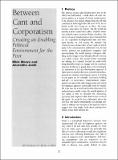| dc.contributor.author | Moore, Mick | en |
| dc.contributor.author | Joshi, Anuradha | en |
| dc.date.accessioned | 2016-02-24T13:29:45Z | |
| dc.date.available | 2016-02-24T13:29:45Z | |
| dc.date.issued | 01/10/1999 | en |
| dc.identifier.citation | Moore, M. and Joshi, A. (1999) Between Cant and Corporatism . IDS Bulletin 30(4): 50-59 | en |
| dc.identifier.issn | 1759-5436 | en |
| dc.identifier.uri | https://opendocs.ids.ac.uk/opendocs/handle/20.500.12413/9099 | |
| dc.description.abstract | Summaries Aid and development agencies like to believe that they manage their development programmes in ways that empower the poor. This is rare in practice, even (or especially?) in the case of newly?fashionable programmes that are explicitly targeted on the poor and justified in terms of ‘empowerment’. Any attempt genuinely to use public anti?poverty programmes to encourage the autonomous, collective mobilisation (‘empowerment’) of the poor will be a struggle — but a worthwhile struggle. How can ‘friends of the poor’ in government or other external agencies design and manage their anti?poverty programmes to encourage this mobilisation? We explore the options and make a case for the importance of creating an enabling institutional environment: the conditions that encourage poor people, social activists and grassroots political entrepreneurs to invest in pro?poor mobilisation. | en |
| dc.format.extent | 10 | en |
| dc.publisher | Institute of Development Studies | en |
| dc.relation.ispartofseries | IDS Bulletin Vol. 30 Nos. 4 | en |
| dc.rights.uri | http://www.ids.ac.uk/files/dmfile/IDSOpenDocsStandardTermsOfUse.pdf | en |
| dc.title | Between Cant and Corporatism | en |
| dc.type | Article | en |
| dc.rights.holder | © 1999 Institue of Development Studies | en |
| dc.identifier.doi | 10.1111/j.1759-5436.1999.mp30004007.x | en |

